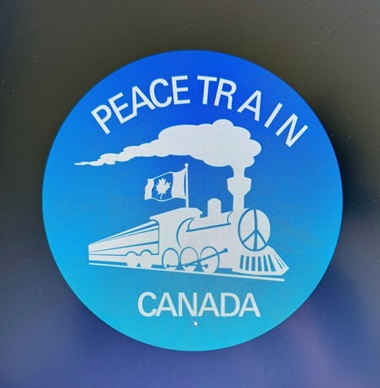 “Now is the time, this is the place and we are the people.”
“Now is the time, this is the place and we are the people.”
This stirring call to social action by Herbert O’Driscoll, in a sermon he gave around 1980 when he was Dean of Vancouver’s Christ Church Cathedral, has shaped my spirituality and life-long ministry as an Anglican layperson working for peace, social justice and environmental stewardship.
Forty years ago, at the height of the Cold War when the threat of nuclear seemed imminent, many Anglicans and other Christians were visible and vocal, carrying banners and singing among the multitude of 115,000 people walking over the Burrard Street bridge in Vancouver’s Walk for Peace, reported to be the largest peace demonstration in Canadian history.
The Church in Canada and internationally played a significant role in the peace movement of the 1980s. This movement, comprised of citizens, politicians, retired high-ranking military officers, security and arms control experts, and diplomats, succeeded in making the world safer by pressuring government leaders to engage in diplomacy and sign arms control treaties.
Canada, as a respected middle power, played an important role in these international negotiations.
It is time once again for us, as Christians and as Canadians, to raise our voices for peace, as wars in the Ukraine and the Middle East cause horrendous civilian suffering and bring us closer than we’ve been in decades to the catastrophic use of nuclear weapons, either intentionally or by accident.
The Peace Train, leaving from Vancouver on November 15th and heading to Ottawa, is calling upon our Canadian government to once again show leadership in diplomacy, peace building and peace making initiatives.
Travelling as a group on the Canadian railway, a symbol of our unity and potential as a country, the Peace Train will show that there are many people in Canada who recall with pride Canada’s historic role as a peacemaker and honest broker, and who regret that in recent years we have failed to vigorously engage in diplomacy and peace initiatives.
The main ‘ask’ of the Peace Train delegation meeting with government officials in Ottawa on November 21st is the re-establishment of an independent institute, similar to the Pearson Peace Centre which was closed 15 years ago. The Peace Train e-petition (which we are all encouraged to sign) calls upon the House of Commons “to establish and fund a Centre of Excellence for Peace and Justice focused on research, education and training in conflict resolution, diplomacy, and peace operations…”
In this dangerous era of increased confrontation and new forms of warfare employing drones and AI, we need security experts and analysts working with diplomats and peace researchers to chart a path away from escalating conflicts which are putting us on the brink of nuclear war. And we need our Canadian government to commit to robust diplomacy and peace building initiatives as an integral part of Canada’s foreign and defence policy
Now is the time, this is the place and we are the people to amplify the message of the Peace Train by attending the launch event on November 14th at the Canadian Memorial Peace Centre (16th & Burrard in Vancouver), by signing the e-petition, and by letting our Members of Parliament know that we want Canada to once again take up our mantle as a middle power working for peace with justice and security for all.
Peace Train theme song: https://www.youtube.com/watch?v=0QpjR6-Uuks
Petition to the House of Commons in Parliament assembled
Whereas:
• Canada signed the Universal Declaration of Human Rights in 1948, pledging itself to achieve, in co-operation with the United Nations, the promotion of universal respect for and observance of human rights and fundamental freedoms;
• Canada’s Truth and Reconciliation Commission and Canada’s adoption of the UN Declaration on the Rights of Indigenous Peoples reflect our commitment to the principles of justice, equality, and freedom;
• Upholding the basics of justice, equality, freedom, security, and wellbeing for all is essential for preventing conflict and war and for Canada’s own security and stability;
• The lack of universal respect for and observance of human rights and fundamental freedoms is the underlying cause of violent conflict;
• An open society and an informed public and parliament is essential for the understanding of complex issues of violent conflict and for the achieving of lasting peace and disarmament; and
• With the closing of the Pearson Peace Centre, Canada lost an important civilian-led, independent institutional structure that supported effective research, policy, and training in peace operations and conflict resolution.
We, the undersigned, citizens and residents of Canada, call upon the House of Commons in Parliament assembled to establish and fund a Centre of Excellence for Peace and Justice focused on research, education and training in conflict resolution, diplomacy, and peace operations for Canadian civilians, police, military personnel and the international community.
Kathleen Wallace-Deering is a life-long Anglican in this Diocese, and has been a parishioner at St. Laurence in Coquitlam since 1985. From 1980 to 1985 she was a staff person with Project Ploughshares (a project of the Canadian Council of Churches), and from 1997 to 2000 she was the first Diocesan staff person for peace, social justice and environmental concerns.
Rev. Margaret Marquardt, Chair of the Justice and Peace Unit for the Anglican Diocese of New Westminster, wrote about the Peace Train for the diocese October 11. She noted, “Folks who will be on the Peace Train leaving Vancouver, Friday November 15 will be in attendance at the [Send off the Peace Train] gathering at Canadian Memorial Church Thursday evening November 14 at 6 pm.” You can contact her with any inquiries.
The Right Reverend John R. Stephens, Bishop of the Diocese of New Westminster, wrote a letter October 22 supporting the Peace Train.
